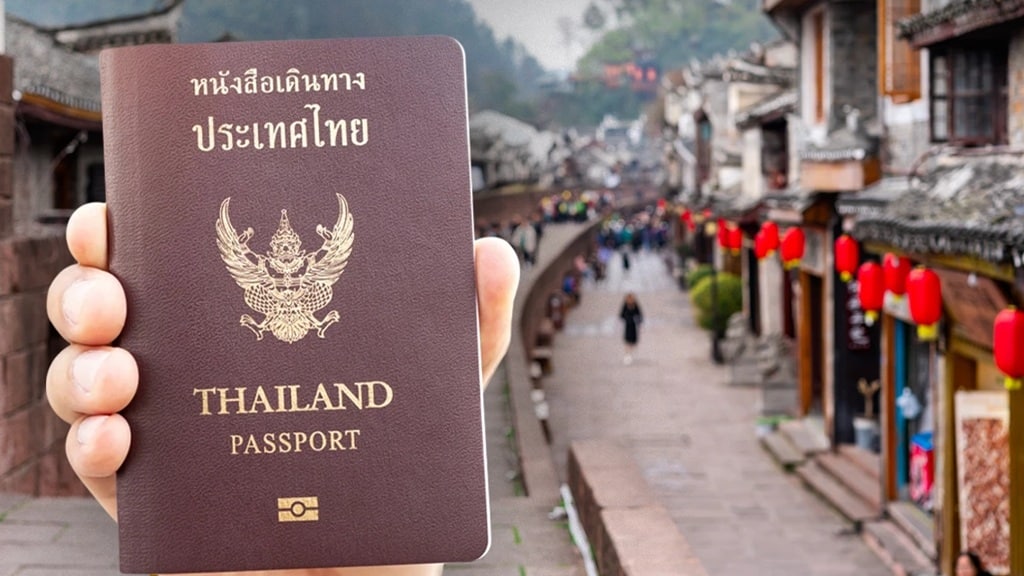BEIJING – China is rolling out a broad visa-free travel policy in 2025 as part of its strategy to boost its economy and attract visitors. This move opens up the country to travellers from around the world, including those from Thailand, who now find it much easier to visit.
China’s economy has faced some tough times recently, struggling with low growth, higher prices, and job losses. The pandemic hit tourism hard, causing international arrivals to drop sharply from 145 million in 2019.
In response, China’s leaders introduced visa-free travel for many countries, hoping to attract foreign visitors and encourage more spending. This policy is not just about numbers; it is also about building better connections and showing the world what China has to offer.

Five Main Ways to Enter China Without a Visa
Travellers looking to visit China in 2025 can choose from 5 straightforward visa-free entry options:
1. 30-Day Visa-Free Entry for Selected Countries
Citizens from 28 countries, such as Thailand, Singapore, and the Maldives, can enjoy up to 30 days per visit in China for tourism, business, family visits or transit. Thai passport holders benefit from an agreement signed in January 2024, which allows multiple visits, up to a combined 90 days in any 180 days.
Visitors need a passport valid for at least six months and proof of onward travel, such as a return flight. No pre-registration is needed; just complete an arrival card and start exploring.
2. 15-Day Visa-Free Entry for More Countries
Between November 2024 and December 2025, citizens from 38 countries, including France, Germany, Italy and Japan, can visit China without a visa for up to 15 days. This includes nine more countries added in late 2024. Travellers need a valid passport and proof of their trip, like hotel bookings or an invitation. This option is perfect for short visits to landmark destinations.
3. 24-Hour Direct Transit
All nationalities can use the 24-hour visa-free transit, available at any entry point. As long as travellers remain in the airport, seaport or train station and have a confirmed onward ticket, they do not need a visa. In some cases, short permits allow leaving the terminal for a quick city visit, but this depends on the immigration officer’s approval.
4. 72 or 144-Hour Visa-Free Transit
At 38 entry ports, including Beijing, Shanghai and Guangzhou, citizens from 54 countries can stay in China for either 72 or 144 hours while transiting to another country. Travellers must show a valid passport, an onward ticket, and a clear plan. This route is ideal for fitting a taste of China into a longer trip.
5. Hainan Province Visa-Free Entry
Hainan, China’s southern island, offers a 30-day visa-free policy to travellers from 59 countries, including Thailand. This applies to tourism, business or family visits through set entry points. Registration with the local police is required within 24 hours, usually handled by hotels, along with proof of the visit’s purpose.

Thai Passport Holders: Stay Up to Six Months
Thai citizens now have greater flexibility when visiting China. With the visa-free agreement, they may stay up to 30 days per visit and make multiple entries, adding up to 90 days within 180 days.
In practice, a visitor can spend up to three months in China by returning to Thailand and re-entering during that six-month window. For longer stays or visits involving work or study, a visa is still needed. This flexibility makes it easier for Thai travellers to spend more time in China without extra paperwork.
China’s Tourism Sector Bounces Back
China’s tourism industry is regaining momentum after the pandemic. With these relaxed rules, the country hopes to welcome millions of visitors from Thailand in 2025. Popular cities like Shanghai and Xi’an are seeing more activity, and Chinese destinations are drawing attention on social media, with Thai travellers sharing stories and photos. Flights and tourism services have increased, digital payments are easier, and travel is smoother than before.
Even as China’s economy faces higher costs and slow growth, tourism brings new life to many regions. International visitors help local economies, from small food stalls in Chengdu to high-end hotels in Shanghai. The visa-free policy lowers travel barriers and encourages spending, helping communities and giving travellers a warm welcome at good prices.
Great Travel Deals from Thailand
Thai travellers can find plenty of affordable options thanks to the visa-free policy. Return flights from Bangkok to Shanghai or Beijing can cost as little as 7,000 baht (£160) on low-cost airlines, especially in autumn. Three-star hotels in big cities start at around 1,500 baht (£35) per night, with many package deals available on booking platforms.
Group tours to famous sights like Guilin or the Pearl River Delta begin from 15,000 baht (£350) for a week, including guides and meals. No visa costs make these trips even more attractive for Thai tourists.
To enjoy your trip, make sure your passport is valid for at least six months and have printed travel plans. Confirm that your hotel can register you with the local police. The autumn months offer pleasant weather, perfect for visiting gardens in Hangzhou or Suzhou.
Learning a few Mandarin phrases can help, especially in smaller towns, while apps like WeChat Pay make payments easier. Whether sightseeing at the Great Wall or tasting local dishes, China’s visa-free policy opens up new travel experiences.
China’s new visa-free policy is more than an economic measure. It’s a chance for travellers, especially from Thailand, to visit more easily and for longer, while enjoying affordable travel and new experiences. From vibrant cities to peaceful islands, China is ready to welcome visitors with open arms. Now is the perfect time to discover what the country has to offer.














